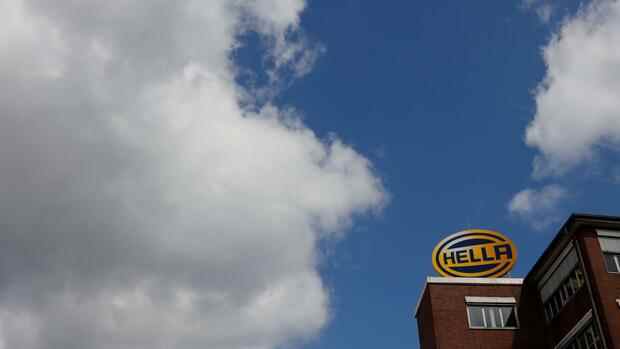The automotive supplier has to lower its annual targets for the second time because of the chip crisis.
(Photo: Reuters)
Dusseldorf The German auto supplier Hella is again cutting its profit targets for the current financial year. The company had already lowered its forecast at the end of September. Now, because of the ongoing chip crisis and the higher material prices, Hella is forced to issue another profit warning.
For the postponed financial year, which ends on May 31, 2022, Hella only expects sales of between 5.9 and 6.2 billion euros. The company had previously expected revenues of up to 6.5 billion euros. Before the first profit warning, Hella had even assumed sales of up to 6.9 billion euros.
Hella’s parent company Faurecia can no longer meet its goals either. The French supplier expects a profit margin of only 5.5 percent instead of more than six percent. In late summer, Faurecia secured the 60 percent stake from the family owners of Hella and was able to take over 19.5 percent of the shares from the other shareholders.
For Hella, the second quarter in particular, which ends on November 30, was unexpectedly weak. During this period, group sales fell by 13 percent due to a lack of semiconductors. Compared to the same quarter of the previous year, the profit margin fell from over twelve percent to just four percent. “Despite our good order situation and market positioning, the bottlenecks in the global supply and logistics chains are making themselves more noticeable in our sales and earnings development than expected at the beginning of the second quarter,” said Hella boss Rolf Breidenbach.
Top jobs of the day
Find the best jobs now and
be notified by email.
This is not only Hella’s experience. At the moment, it is mainly the automotive suppliers who are troubled by the lack of chips and the higher material prices, as a current analysis by the strategy consultancy PwC shows. The car manufacturers would have increased their orders out of concern about the supply chains. “However, these are currently not being accessed because the car manufacturers can only deliver vehicles with a delay due to the lack of chips,” said PwC industry expert Thomas Steinberger.
The result: suppliers like Hella suffer from high inventories. Rolf Hünermann sees a core problem here. The lawyer is a partner in the Frankfurt office of the law firm Reed Smith LLP and represents numerous medium-sized suppliers. While the suppliers have to keep material and personnel in stock at all times in order to prevent delivery failures and the resulting claims for damages, conversely the binding effect of the carmaker to purchase certain quantities from their suppliers is only weak. “There is a lack of commitment here,” Hünermann recently criticized in the Handelsblatt.
Meanwhile, Hella does not expect a quick recovery from the chip crisis. “From our point of view, we have not yet crossed the valley,” says Breidenbach. In addition, there are problems with the procurement of preliminary products and raw materials. According to the Ifo Institute, 88 percent of companies in the auto industry are already complaining about bottlenecks. “The hoped-for relaxation has not materialized,” said the head of the Ifo surveys, Klaus Wohlrabe.
Paul Singer holds shares in Hella
For the French auto supplier Faurecia in particular, the lack of recovery in the auto markets and Hella’s profit warning could become a problem. The takeover of the Hella shares of 79.5 percent will cost Faurecia over five billion euros. In order to meet these costs, Faurecia has to take on new debt.
However, at the time of the takeover, the company presented an ambitious plan to investors, according to which the debt of the combined Faurecia-Hella Group should fall back to a level from before the takeover in 2023. Assuming that Faurecia will have a quick market recovery. But that’s not what it looks like at the moment.
And that’s not Faurecia’s only problem. The activist financial investor Paul Singer has secured the remaining Hella shares. Singer is known for securing a minority stake in corporations that are about to be taken over in order to achieve a higher price at the latest when remaining shareholders are to be pushed out in a so-called squeeze-out procedure in return for compensation.
More: Patrick Koller and Rolf Breidenbach explain how they want to bring the automotive suppliers from France and Germany together – and why there will only be one CEO in the end.

